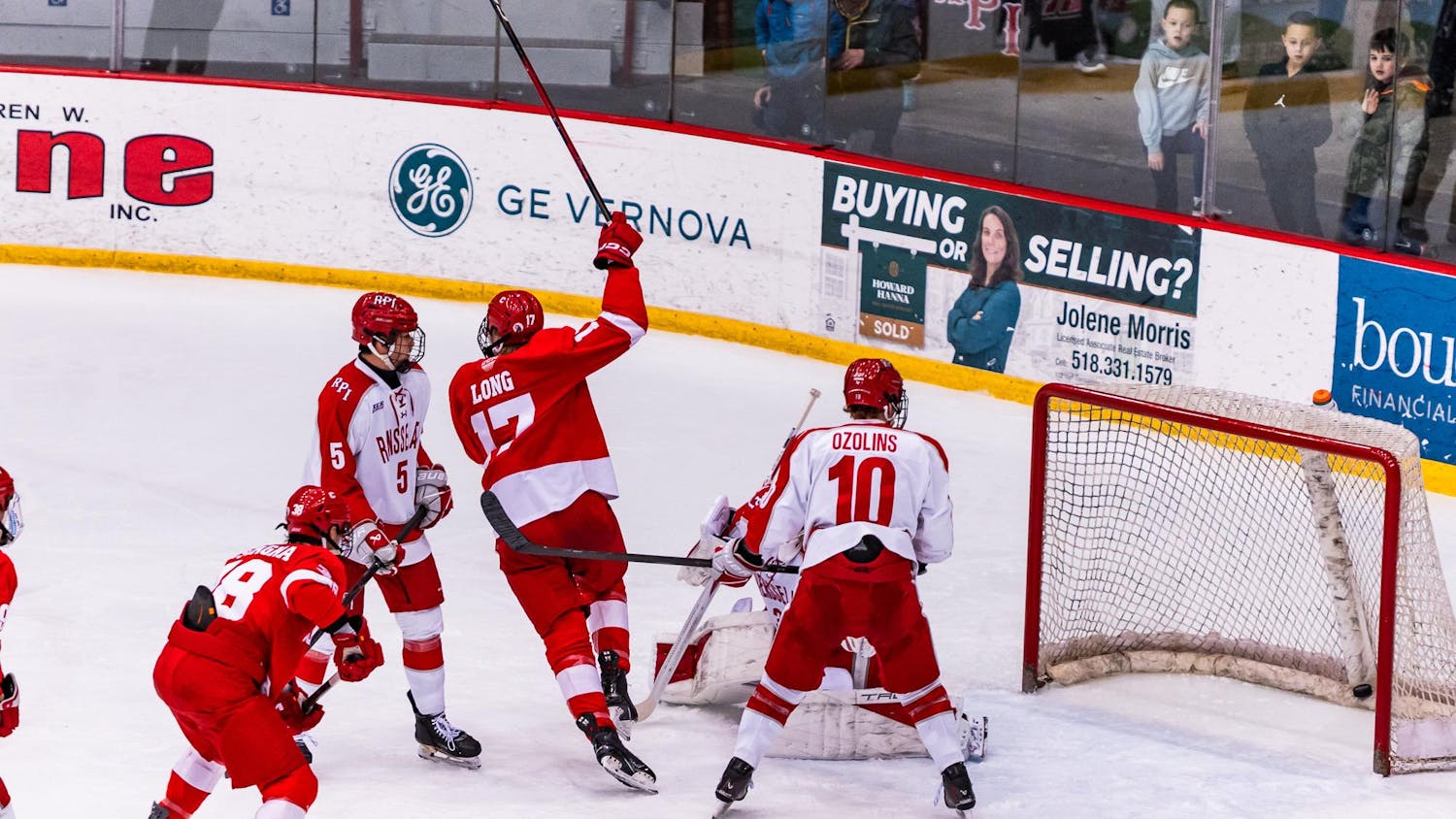“People always worry about things you can't control. Always,” said outgoing men’s hockey head coach Mike Schafer ’86. “And if you find that wisdom to know the difference between what you can control and what you can’t, you'll live a happier life.”
For 30 years, Schafer’s main obligations on the Hill were to lace up his skates, blow a whistle and coach hockey. For most of his life, hockey has been at the forefront. Just a few weeks ago, Schafer coached his final hockey game at Cornell and will soon retire after a decorated career.
“When I talk to our players and I talk to our alumni, talk to fundraisers, talk to different groups … I'm the expert in that area of hockey and Cornell hockey, so it makes it a lot easier,” Schafer said. “But to really think about what you'd say in your last lecture and try to piece that all together with all the different things that you try to teach your players throughout the course of a four-year career, is kind of intimidating.”
The “Last Lecture” series awarded Schafer an opportunity to bestow his departing wisdom upon curious Cornellians. The initiative offers notable figures at Cornell a chance to explore themes and messages that aren’t likely to be taught in a classroom. For Schafer, this was also his “first lecture,” he noted with a laugh.
On Wednesday evening in front of a packed lecture hall in Baker Laboratory, Schafer centered his thoughts around what makes a prosperous team culture, and how that culture can be applied away from the rink. His recipe has proven successful over Schafer’s three decades of experience, culminating in 561 wins, three ECAC regular season championships, seven ECAC tournament championships, 15 NCAA tournament appearances and one Frozen Four.
Many members of Schafer’s 30th and final team were in attendance for the lecture, as were numerous student athletes representing various Cornell Varsity teams, including women’s hockey, women’s soccer, field hockey, volleyball, men’s lacrosse and track and field, among others.
In all, Schafer’s lecture prompted the 496-person lecture hall to be filled to capacity, with attendees hailing from all backgrounds.
“When you guys go to Lynah Rink, it's not because you probably knew a lot about hockey. It's because it's an event, right?” Schafer said. “It's to go there and cheer on your University and cheer on your school, and have pride.”
Schafer opened up about his upbringing as a first-generation college student growing up in the small town of Durham, Ontario. He noted that his upbringing as the youngest of nine children, and his relationships with his parents, fueled the team culture he initially established when he began coaching at Cornell full-time in 1995.
“I tell our team all the time — you either love to win or you hate to lose, but there's always something that really motivates you in your life. And for me, it was my mother, who told me, ‘You can't do it,’” Schafer said. “So [my motivation] is to prove people wrong. Always has been, and it always will.”
Thirty years of soaking in information forced Schafer to alter his coaching formula. He cited two books — ‘Mindset: The New Psychology of Success’ by Carol Dweck and ‘Season of Life’ by Jeffrey Marx — that led him to adopt a “growth mindset” and evolve his coaching philosophy in three areas: redefining masculinity, creating a legacy and building relationships and trust.
“Trust is, to me, the most important thing in my relationships with anybody in my life. So it then takes me to this lecture: ‘How will you [be] remembered?’” Schafer said. “Do you want to be remembered for what you did or how you did it? That's legacy.”
Schafer also emphasized hard work and service as two of the pillars of his program, and shared videos from the team’s annual service trip to the Dominican Republic in support of the Portal De Belen Foundation, where players contribute labor for local structures and interact with the youth on and off the playing field.
Throughout 2024-2025, Schafer’s team battled adversity, including the mounting list of injuries the lineup persevered through en route to a championship-winning season. Though his expertise remains steadfast to hockey, Schafer’s remarks revolved around leadership and character, and what defines them outside of the ice rink.
“It's about process versus result,” Schafer said. “Everybody wants to win a national championship, everybody wants to win a game, everybody wants to be financially successful, everybody wants to be happy in their job, but you have to follow the process rather than the result, or you're going to be really disappointed.”
Aside from his current student-athletes, Schafer had a number of close colleagues in attendance for his lecture. His successor, Casey Jones ’90, as well as women’s hockey head coach Doug Derraugh ’91 watched from the second row of the lecture hall.
Schafer also acknowledged two of his former professors in the audience, including Brian Earle ’67 and a communication professor that reportedly gave Schafer a B- in 1984.
Above all, the lecture provided an opportunity for students, athletes, professors and Ithaca residents alike to hear from one of the very best in college hockey, away from the home bench at Lynah Rink. As he concluded his remarks, Schafer defined what it means to be mentally tough — a mentality his student-athletes embody, and one that Schafer implored his audience to tap into.
“Over 30 years, I've reinvented myself [and] kind of relearned our sport,” Schafer said. “[On the team], we have givers, not takers — people who are mentally tough. They give, they don't take. It’s a pretty simple thing.”
Jane McNally is a senior editor on the 143rd editorial board and was the sports editor on the 142nd editorial board. She is a member of the Class of 2026 in the College of Agriculture and Life Sciences. You can follow her on X @JaneMcNally_ and reach her at jmcnally@cornellsun.com.











